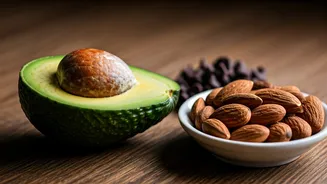Melatonin's Power
Melatonin, often dubbed the 'sleep hormone,' plays a crucial role in regulating our sleep-wake cycle. Certain foods contain melatonin, helping the body
to signal it's time to sleep. These foods essentially help to prep the body for sleep by supplementing the natural melatonin production. In essence, these foods give your body the raw materials needed to produce melatonin. The use of foods rich in melatonin helps the brain to initiate the sleep cycle more smoothly, resulting in a quicker onset of sleep and a more consistent sleep schedule. Consuming foods high in melatonin, especially before bedtime, can provide the body with a boost needed to enhance the sleep experience.
The Cherry's Influence
Cherries, particularly tart cherries, are a remarkable source of natural melatonin. Studies have shown that consuming cherry juice or whole cherries can significantly improve sleep duration and quality. The melatonin present in cherries assists in regulating the body's internal clock, also known as the circadian rhythm. This influence makes it easier to fall asleep and stay asleep. Regular intake of cherries before bed can therefore help in the reduction of sleep apnea. The antioxidants in cherries further benefit sleep, by promoting the health of brain cells and reducing inflammation, which in turn leads to a calmer, more relaxed state that is favorable for sleep.
Nuts and Seeds
Nuts and seeds, especially almonds and pumpkin seeds, are rich in tryptophan, an amino acid that converts into serotonin and melatonin. Serotonin is a neurotransmitter that helps regulate mood, while melatonin supports the sleep-wake cycle. These nuts and seeds also offer magnesium, another essential mineral for sleep. Magnesium aids in relaxation by helping the muscles unwind, easing the mind and body into a state of rest. Almonds are considered one of the best sleep-aiding nuts due to their nutrient profile. Including a handful of almonds or pumpkin seeds in your evening routine can therefore improve sleep quality. This can significantly reduce the symptoms of sleep apnea.
Fatty Fish Benefits
Fatty fish, such as salmon, are rich in omega-3 fatty acids and vitamin D, both of which are important for sleep. Omega-3s help to regulate sleep patterns, while vitamin D plays a role in the production of melatonin. These nutrients can improve sleep quality, which ultimately leads to reduced symptoms of sleep apnea. Omega-3 fatty acids and vitamin D together promote better sleep patterns. Regular consumption of fatty fish can therefore significantly impact the improvement of sleep quality. It is advisable to incorporate fatty fish into a regular diet to facilitate the natural sleep cycle.
Kiwi's Impact
Kiwis are another food that can dramatically improve sleep. Kiwis are abundant in serotonin and antioxidants, which are both crucial for sleep regulation. Studies have demonstrated that consuming kiwi can enhance sleep duration and quality. Kiwi contains compounds that are good for sleep and also provide relief from sleep apnea symptoms. Their ability to improve the sleep cycle makes kiwi an ideal fruit to include in the evening diet. The combination of nutrients in kiwis supports better sleep quality, therefore contributing to less frequent sleep disturbances.











